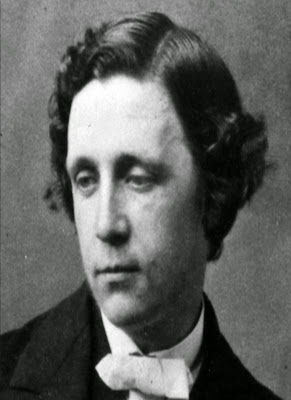Charles Lutwidge Dodgson (/ˈtʃɑrlz ˈlʌtwɪdʒ ˈdɒdsən/; 27 January 1832 – 14 January 1898), better known by his pen name, Lewis Carroll (/ˈkærəl/), was an English writer, mathematician, logician, Anglican deacon and photographer. His most famous writings are Alice's Adventures in Wonderland, its sequel Through the Looking-Glass, which includes the poem Jabberwocky, and the poem The Hunting of the Snark, all examples of the genre of literary nonsense. He is noted for his facility at word play, logic, and fantasy. There are societies in many parts of the world dedicated to the enjoyment and promotion of his works and the investigation of his life.
During his early youth, Dodgson was educated at home. His "reading lists" preserved in the family archives testify to a precocious intellect: at the age of seven the child was reading The Pilgrim's Progress. He also suffered from a stammer – a condition shared by most of his siblings – that often influenced his social life throughout his years. At the age of twelve he was sent to Richmond Grammar School (now part of Richmond School) at nearby Richmond.
From a young age, Dodgson wrote poetry and short stories, both contributing heavily to the family magazine Mischmasch and later sending them to various magazines, enjoying moderate success. Between 1854 and 1856, his work appeared in the national publications, The Comic Times and The Train, as well as smaller magazines like the Whitby Gazette and the Oxford Critic. Most of this output was humorous, sometimes satirical, but his standards and ambitions were exacting. "I do not think I have yet written anything worthy of real publication (in which I do not include the Whitby Gazette or the Oxonian Advertiser), but I do not despair of doing so some day," he wrote in July 1855. Sometime after 1850, he did write puppet plays for his siblings' entertainment, of which one has survived: La Guida di Bragia.
In 1856 he published his first piece of work under the name that would make him famous. A romantic poem called "Solitude" appeared in The Train under the authorship of "Lewis Carroll". This pseudonym was a play on his real name: Lewis was the anglicised form of Ludovicus, which was the Latin for Lutwidge, and Carroll an Irish surname similar to the Latin name Carolus, from which comes the name Charles. The transition went as follows: "Charles Lutwidge" translated into Latin as "Carolus Ludovicus". This was then translated back into English as "Carroll Lewis" and then reversed to make "Lewis Carroll". This pseudonym was chosen by editor Edmund Yates from a list of four submitted by Dodgson; the others being Edgar Cuthwellis, Edgar U. C. Westhill and Louis Carroll.
Excerpt from Wikipedia
Literary Works
- La Guida di Bragia, a Ballad Opera for the Marionette Theatre
- Alice's Adventure In Wonderland - Read Online | Download PDF
- Rhyme? And Reason? - Read Online | Download PDF
- Through the Looking-Glass, and What Alice Found There
- The Hunting of the Snark
- A Tangled Tale - Read Online | Download PDF
- Sylvie and Bruno
- Sylvie and Bruno Concluded
- Pillow Problems
- What the Tortoise Said to Achilles
- Three Sunsets and Other Poems
Mathematical Works
- A Syllabus of Plane Algebraic Geometry
- The Fifth Book of Euclid Treated Algebraically
- An Elementary Treatise on Determinants, With Their Application to Simultaneous Linear Equations and Algebraic Equations
- Euclid and his Modern Rivals
- Symbolic Logic Part I
- Symbolic Logic Part II
- The Alphabet Cipher
- The Game of Logic
- Curiosa Mathematica I
- Curiosa Mathematica II
- The Theory of Committees and Elections
Other Works
- The Principles of Parliamentary Representation
- Some Popular Fallacies about Vivisection
- Eight or Nine Wise Words About Letter-Writing
- Notes by an Oxford Chiel






No comments:
Post a Comment